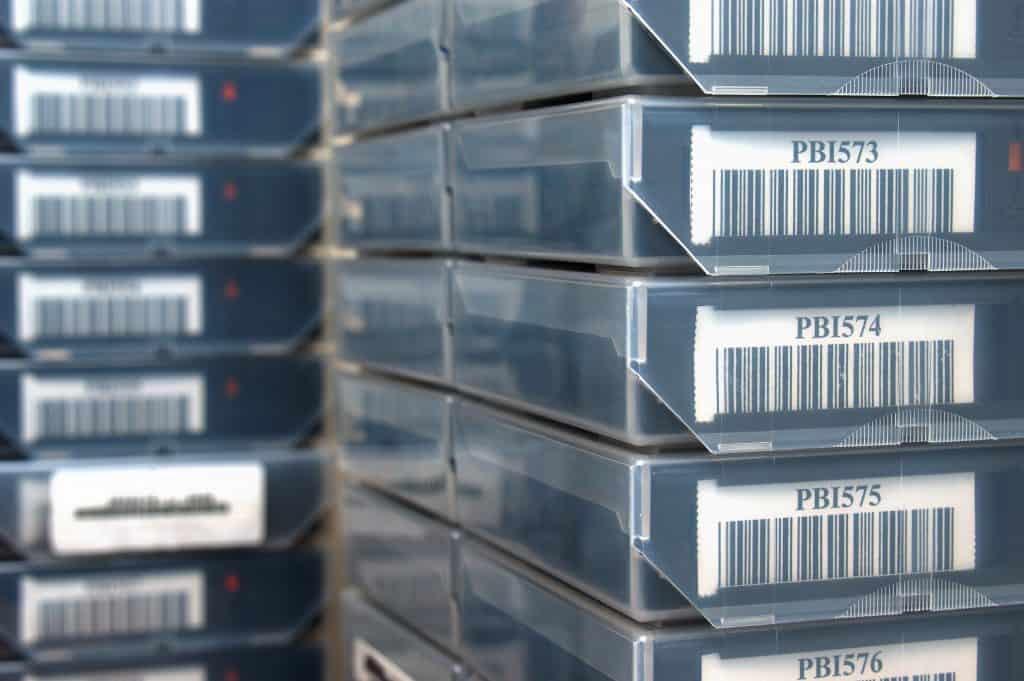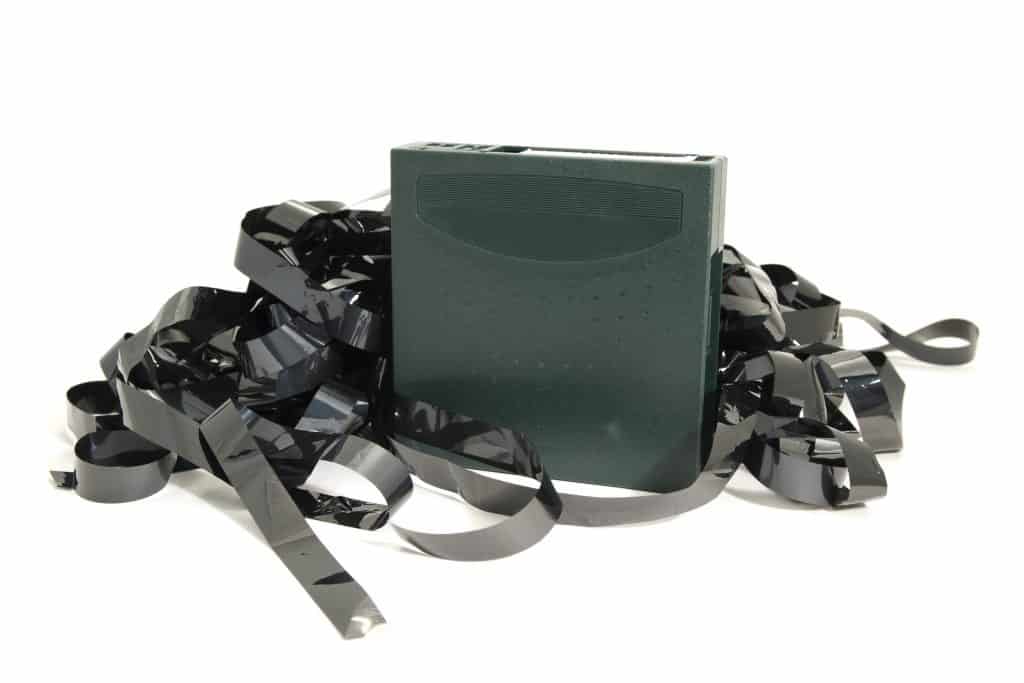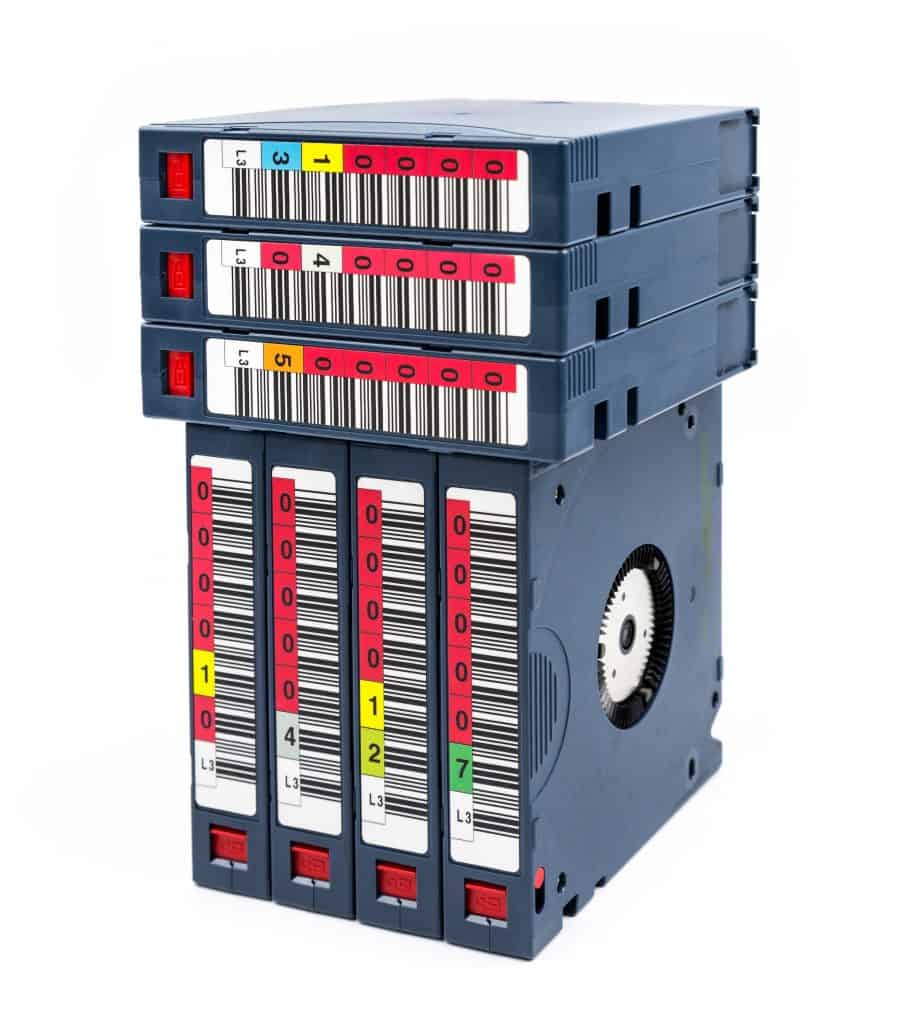Tape Data Recovery
Tapes are considered an affordable backup strategy as they are cheap to buy, very durable, and a good choice for long-term storage. They are available in multiple tape formats. Tape data cartridges should be stored in a dry, moisture-proof fire safe to ensure the tape lasts for a long time.
Many large companies, small businesses, and individual users prefer tape drives because the data backups are portable; you can hold the backup in your hand. Huge amounts of data can be moved from A to B without the need for superfast networking. They can also be used for disaster scenarios in the event of a serious loss of data. However, sometimes tape backup software fails and the tape itself is damaged or corrupt, leaving a business with a data loss emergency. That’s when you need experts to provide tape recovery services.

Tape backups are a longstanding storage device technology in IT departments. Tape drives have been working hard in data centers around the world for several decades, and despite the recent surge in cloud computing, many companies still rely on tape backups for their day-to-day data protection objectives.
Do You Need Data Recovery from Tape Backups?
We Can Help!
Talk to an expert about your tape backup recovery needs and getting your data back. Get a no-hassle consultation today!

Is Tape Backup Still Viable?
Some may argue that the writing is on the wall for the longevity of tape backups as cloud storage is now so incredibly cheap that full system backups can be saved online for very little cost. Magnetic tape data storage may endure in private data centers, legacy service provider operations, and companies that must archive data for many years. Needless to say, there are still a huge amount of tape backups in circulation, and the format will be around for a long time as enterprises continue to archive data.
Tape data recovery is one of the data recovery services offered by the data recovery experts at Gillware. We see tapes in all shapes and sizes, some from private clients, others from major corporate businesses. Magnetic tape media traditionally uses tape cartridges for backups which are available in many different tape formats. Each format has varying data capacity, longevity, cost, and physical profile.
Gillware, a data recovery company located in Madison, WI, receives various tapes at our data recovery lab. We have the capability to perform tape data recovery services on:
- Digital Linear Tape (DLT) – DLT, manufactured by Quantum, is one of the oldest tape types we see. The use of DLT was prolific in the 1980s and 1990s. They are very popular because DLT Tapes offer a great balance between cost, speed, and capacity.
- Linear Tape-Open (LTO) – LTO is probably the most common type of tape in use today, also manufactured by Quantum. They come in huge capacity with very good read/write capabilities. Introduced in the early 2000s, LTO tapes are by far the most popular tape in use. The latest revision (LTO-9) can store up to 45TB of data, and they only cost a few hundred dollars.
- Sun/StorageTek T10000 (T10k) – The STK drives are popular for a mainframe, i-series, and other open systems used in the data center. Systems that operated 24/7 typically use Sun (now Oracle) tapes.
- Others – Occasionally we may receive AIT and DAT formats for tape recoveries.
I Found Some Old Tapes and I Need Data Off of Them. What Do I Do?
One of the most common tape recovery services we offer is the identification and recovery of unknown format types or recovery of tape data when the original equipment is gone or missing. Sometimes a business is moving to a new location and they find a box of 200 tapes in the closet. Nobody wants to pitch them in the trash, but nobody really knows exactly what’s on them and what hardware or software was used to record them. But people don’t want to throw them away because of industry regulations or fear of the unknown.
Gillware has seen it all, and we can figure out what hardware and software stack was used, catalog the tapes, and extract them to a modern medium in a non-tape format. The more we know about the tapes, the better (when questions are answered up front, it’s less research on our end meaning faster and cheaper services), but if you don’t know anything, have no fear; we can figure it out.
In another common scenario, a client is going through an e-discovery process where a civil litigator’s clients are being compelled to produce emails or documents from a time period where the only copy of this data might live on an old tape backup they don’t know how to deal with. The tape recovery process is a lot like the first example but with a few additional steps taken to handle the evidence and possibly additional steps to sort and locate the specific data relating to the lawsuit claims.
Can I Do My Own Tape Recovery?
Tape data recovery is a very specialist field, and it is not easy to perform tape recovery. This might be down to encryption being used, the number of tapes used in a backup, and because tapes use sequential access to the data; therefore any distress to the tape media can be fatal. This is why data recovery companies are frequently contracted for their tape data recovery service when something goes wrong.
Our customers approach Gillware tape data recovery services typically facing one of two possible tape recovery scenarios:
- The physical tape drive is preventing read/write access to the tape media
- The tape media is preventing read/write access to the data (tape failure)

In such scenarios, a home fix can be ruled out. The one possible workaround is if you are facing a hardware fault on your physical tape drive, you may be able to claim a repair under warranty or send the drive away for repair. The only other option for tape recovery is to get in touch with Gillware for data recovery services; we can assist with all your data recovery needs.
What Are Data Recovery Techniques?
The good news is that Gillware is staffed with expert tape specialists when it comes to recovering your critical data from failed, damaged and corrupted data storage tapes. There are many types of tape impairment that our data recovery experts see in the Gillware Lab, but each can be broken down into two categories; physical faults and logical issues.
Tapes arrive at our headquarters in Madison, Wisconsin in various conditions. As well as physical damage and logical faults, we see failures reading/writing backup data, broken tapes, sabotaged tapes, fire, smoke, and water damaged tapes and tapes that have been accidentally overwritten.
- Physical Faults– Gillware can repair and recover data from tapes suffering from physical damage, such as a tape where the cartridge is smashed or warped significantly. The success rate of fixing physically damaged media is very high. We can also fix damage to the tape ribbon itself, as tape can on occasion become folded, creased, and even torn. This may be a result of human error or the storage conditions, but more often than not, it is the tape libraries that damage the tape ribbon.
- Logical Issues– Logical data corruption is a common problem faced by our patrons, and we have a very high rate of success recovering data from a corrupt tape drive. The recovery process can take a long time depending on numerous factors, such as the size of the tape and the amount of corruption. However, once we have the data, our in-house data recovery tool Hombre takes over to rebuild the data, which is a significantly quicker process.
How Successful Is Data Recovery?
At Gillware, the success rate of tape data recovery is very high for tape media, with a >99% success rate. All tape data recovery is completed by experts in our data lab, and once a customer has completed a request online, or you can e-mail or call the team on 977-624-7206. A shipping label will be provided free of charge to collect the tape media and ship it to the team. The media is cataloged and processed upon arrival, and the customer can track the recovery progress of each case using our online portal.
After an initial free-of-charge investigation, we will contact the customer with details about what data structure can be recovered, an estimate of how many data files can be recovered, and a firm price of the work. Only upon agreement from the customer that we move to the data recovery stage.

There are two ways in which we recover tape backup files. We have an extensive selection of tape drives and backup systems that work with the overwhelming majority of tape formats. We. have a licensed collection of tape data recovery software available in-house, and a large collection of tape cartridges if a rebuild of the tape is needed.
Secondly, we use our in-house proprietary data recovery solutions to make a copy of the tape data. Hombre was built by Gillware data scientists, and you will only find it in our labs, we do not sell it or license it to anyone else. Once our engineers have finished with Hombre and the tape recovery is complete, the customer will have the option to download the files, or we can copy the files to an alternative data source and ship them to the customer’s home address.
Do You Need Data Recovery from Tape Backups?
We Can Help!
Talk to an expert about your tape backup recovery needs and getting your data back. Get a no-hassle consultation today!

